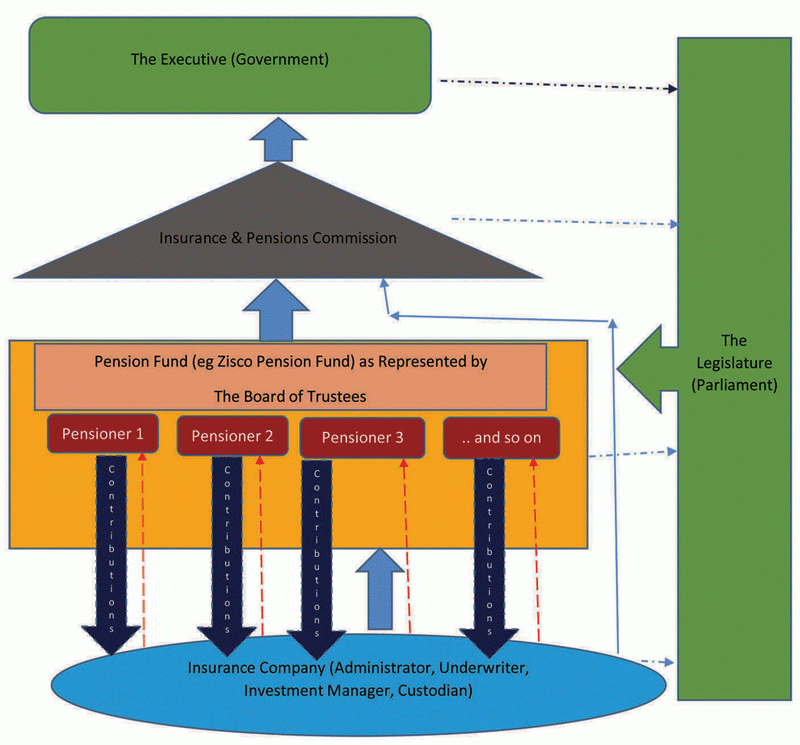
It is apparent that insurance companies are using the unlimited financial resources ill-gotten from pensioners in a vicious thrust to mislead the courts,that ordinary pensioners and ordinary pension fund members cannot sue them (insurance companies) as litigants in afailure to honour pensioners’ rights from pension funds.
The insurance companies are wrongly arguing that they are legally agents to ordinary pensioners and pension fund members, in court matters where they are being sued by pension fund members, jointly and severally with the Pension Fund, the Pension Fund’s Board of Trustees and the patron employer (often misleadingly referred as the sponsoring employer), as defendants.
The joint litigation of these Defendants is legally meant to close loopholes by which a given Defendant with a statutory role to honour pensioners’ rights from a pension fund, can escape liability to pensioners in the event the pensioner succeeds in this suite. Such a strategic suite is permissible as provided for in the then Pension and Provident Funds Act. Pensioners have for a long time been calling for pension funds, and insurance companies to honour pensioners’ rights from pension arrangements, as provided for in the then existing Pension and Provident Funds Act.
Insurance companies, with a complicit Pension Fund ‘system’, Insurance and Pension Commission (IPEC) as the regulator being especially deliberately complicit, have been reticent about it all and refusing to honour the pensioners’ rights – hence the litigations.
This insurance company misleading submission to the Courts is meant to exclude miscreant insurance companies from litigation as custodians of pension funds, leaving only the pension fund, its Board of Trustees and the patron employer.
In these circumstances relief to the pensioners can be difficult.

In terms of the then Pension and Provident Funds Act, insurance companies in fact report directly and severally to a) ordinary pension fund members, b) pensioners, c) Pension Fund Boards of Trustees, d) the Trustees themselves individually, e) the patron employers (businesses) to the pension fund members, and to f) IPEC, the regulator and supervisor of pension and insurance services, among other entities like Parliament.
As in many flourishing pension industries and jurisdictions from which Zimbabwe inherited itspension system modus operandi, insurance companies, playing multiple roles to pension funds as administrators, underwriters, solvency managers, investment managers, custodians, among others are in a multiple reporting protocol as depicted in the diagram below.
- UK based Zimbabwean divorces wife of 33 years over conjugal rights
- New perspectives: Money laundering red flags in insurance sector
- 3 000 non-resident pensioners owed US$1.5 million, says Ipec
- Removing barriers to women’s financial inclusion
Keep Reading
In a clear illustration of insurance company reporting instance, the insurance companies are required by the Act to report directly annually to each and every pensioner or pension fund member, in form of Annual Pension Benefit Statements.
In accordance with these provisions of the Act, an ordinary pensioner or pension fund member can require an insurance company to explain any anomalies in their pension benefit statement, and hence their pension.
Nothing can stop such a pensioner or pension fund member from suing the incumbent insurance company if they are not satisfied with the performance of the insurance company.
In so attempting to evade liability from both the Pension Funds and its pensioners and pension fund members, insurance companies have again, apparently and successfully strategically pulled the wool over Pension Funds Boards of Trustees’ eyes by requesting them to delay responding to the courts, in the court cases that the pensioners are bringing against all bodies statutorily required to ensure pensions are delivered; and allow only them (insurance companies) and IPEC to respond.
This strategy of staying the hand of Pension Funds and their Trustees is meant to avoid a certain fight, in court, between the insurance companies and Pension Funds as the courts would certainly be given evidence that the Trustees, pensioners and pension fund members in general, severally contracted the insurance companies to act as administrator, underwriter, solvency manager and custodian, in terms of the then Pension and Provident Funds Act.
It must be noted here that Pension Fund Boards of Trustees have for a long time been deceived by insurance companies into decisions that are now hindering the honouring of their rights from pension funds. Articles on subversion of Pension Fund Boards of Trustees have discussed this deceit on many occasions.
Once the insurance companies have secured this deceitful agreement from Boards of Trustees especially, it is apparent that insurance companies then nit-pick on pensioners’ submissions (summons) to the courts for technical shortcomings to mislead the courts and defeat the summons using inapplicable Acts or laws such as Prescription Act and/or exceptions.
In so doing, insurance companies are firstly misdirecting the courts to preclude any submissions to the courts by pensioners about the statutory roles that insurance companies are required to play in order to ensure delivery of pensions and about statutory agreements between themselves and all the stakeholders highlighted above.
Secondly, they are taking full advantage of several shortcomings in the pension operating environment, not least the poorly resourced pensioners, the incompetence of lawyers used by the pensioners considering their poor resources, the sheer complexity and technicality of pension operations and its unfamiliarity to the lawyers and to the courts as represented by the Judiciary Service Commission of Zimbabwe to secure judgments pronouncing that they can't be sued by pensioners.
More specifically insurance company lawyers are securing judgments in their favour purely based on manipulated and unintended technical mis-statements on the part of pensioners and their lawyers, as opposed to judgment premises on realities of pension operations as provided for by the Pension and Provident Funds Act.
The question to the legal fraternity, the legislature to the courts is, "can a legal precedence be founded on false premises, manipulated and presented to be correct, as contrasted with the dictates of the then existing Act? Isn't there a need for appropriate training for lawyers, Parliamentarians and all involved?"
- Tarusenga is the general manager of Zimbabwe Pensions & Insurance Rights Trust. — [email protected].











